CIA invests in companies revealing your tweets and photos on Instagram
- Transfer

Robot programs that handle complex objects, computer algorithms designed to detect “intrasystem threats”, and artificial intelligence capable of analyzing large amounts of data are just a few technologies developed by companies commissioned by In-Q-Tel, a venture capital firm CIA, according to a document received by The Intercept.
Nevertheless, 38 previously unknown companies receiving funding from In-Q-Tel have focused on collecting, filtering, analyzing and monitoring social media information; the documents received indicate several companies working in this area, including Dataminr, Geofeedia, PATHAR, and TransVoyant.
These four firms, which provide unique tools for retrieving data from platforms such as Twitter, were represented in San Jose at the February сам Summit of CEOs ’of fund-sponsored firms, along with other In-Q-Tel companies. .
These investments seem to reflect the CIA's growing interest in monitoring social networks. Last September, David Cohen, the second person in the CIA hierarchy, spoke in detail at Cornell University about a long list of issues posed by new media. “The Islamic State’s sophisticated use of Twitter and other social media platforms is a good example of the harmful use of these technologies,” he said.
Social networks also offer a wealth of potential intelligence; Cohen noted that Twitter messages from the Islamic State organization (also called ISIS, whose activities are prohibited on the territory of the Russian Federation) provided useful information. “ISIS tweets and other social media posts about their actions often contain information that - especially when combined with other information - is of real value to intelligence,” he said.
Now the next stage of investments from In-Q-Tel has begun to operate, since the CIA has expanded its activities to Silicon Valley by establishing a new institution - the Digital Innovation Department, which is tasked with developing and deploying the most advanced solutions by directly involving the private sector. The Office works closely with In-Q-Tel to integrate state-of-the-art technology into the intelligence capabilities of the entire agency.
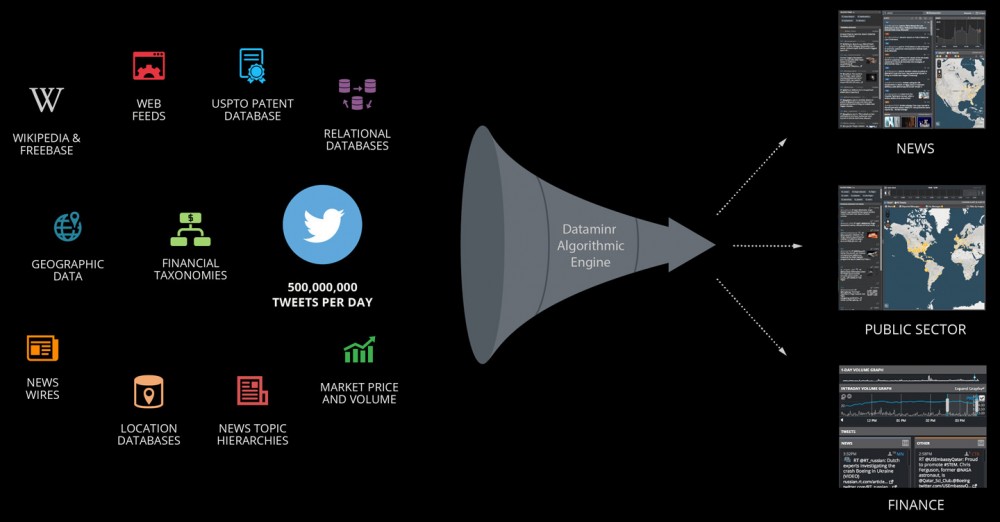
Dataminr directly tracks the flow of data from Twitter to identify trends and detect emerging threats.
Dataminr directly tracks the flow of data from Twitter to visualize and quickly identify trends on behalf of law enforcement agencies and hedge funds along with other clients.
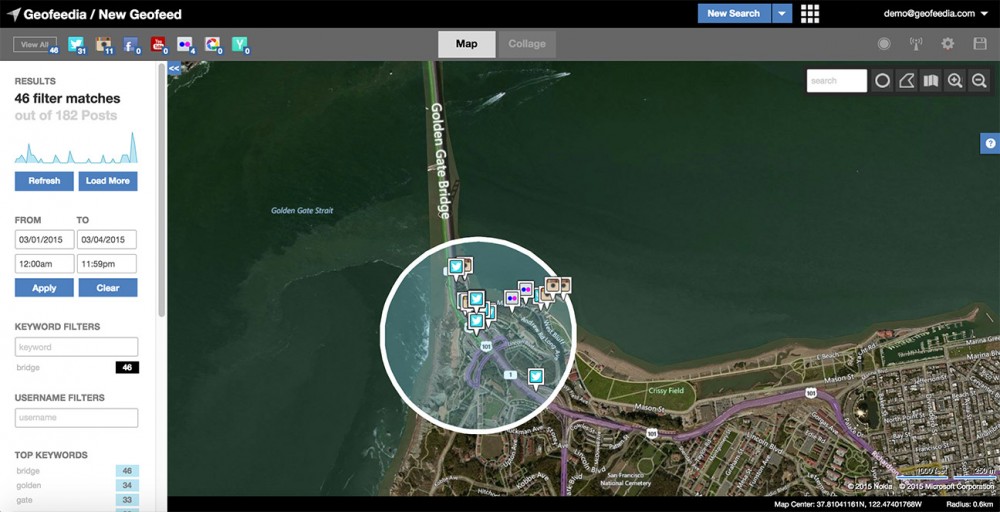
Geofeedia collects geo-linked social media posts to keep track of real-time important events.
Geofeedia specializes in collecting territory-related messages from platforms such as Twitter and Instagram to monitor the development of important events in real time. This company, whose customers are dozens of local law enforcement agencies, is launching its ability to track activist protests on behalf of both corporations and police departments.
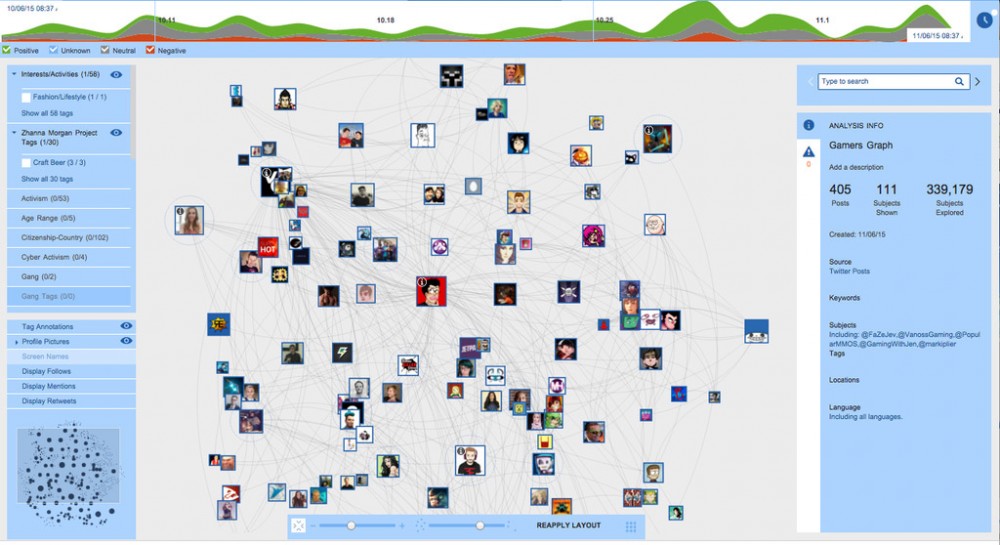
PATHAR tracks social networks for associations.
Dunami, developed by PATHAR, is used by the FBI to “monitor Twitter, Facebook, Instagram and other social networks to identify associations, centers of influence and potential signs of extremism,” according to a Reveal study.
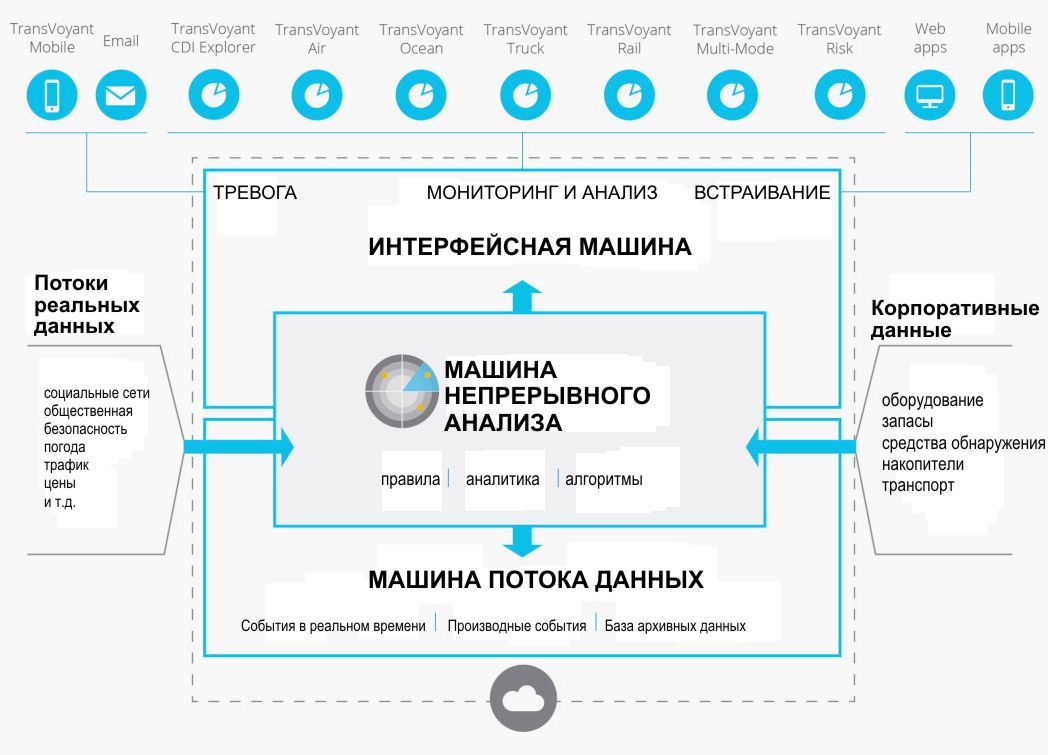
TransVoyant company analyzes information flows to provide understanding of global events and their forecasting.
TransVoyant, founded by Dennis Grozeklos, former vice president of Lockheed Martin, provides similar services to the so-called "Decision makers" by analyzing the numerous information flows. The firm advertises its ability to track Twitter to identify “criminal gangs” and threats to journalists. The TransVoyant team worked with US forces in Afghanistan, combining data from satellites, radars, reconnaissance aircraft, and drones.
Dataminr, Geofeedia, and PATHAR did not respond to repeated requests for comment. Heather Crotty, Marketing Director at TransVoyant, acknowledged the investment from In-Q-Tel, but declined to discuss their relationship. In-Q-Tel does not “disclose the financial conditions of its investments,” said Ms. Crotty.
Carrie A. Sessine, vice president of external affairs at In-Q-Tel, also declined to be interviewed because the foundation "does not participate in interviews or other media events."
In the last ten years, In-Q-Tel has made several public investments in companies specializing in processing large amounts of online data. In 2009, the fund collaborated with Visible Technologies, a company that specializes in managing reputation on the Internet, determining the influence of “positive” and “negative” authors on a number of platforms for a certain subject. Six years ago, the In-Q-Tel Foundation began working with NetBase, another social media analytics firm that advertises its ability to view “billions of sources in public and private online information,” as well as with Recorded Future that tracks the network to predict events.
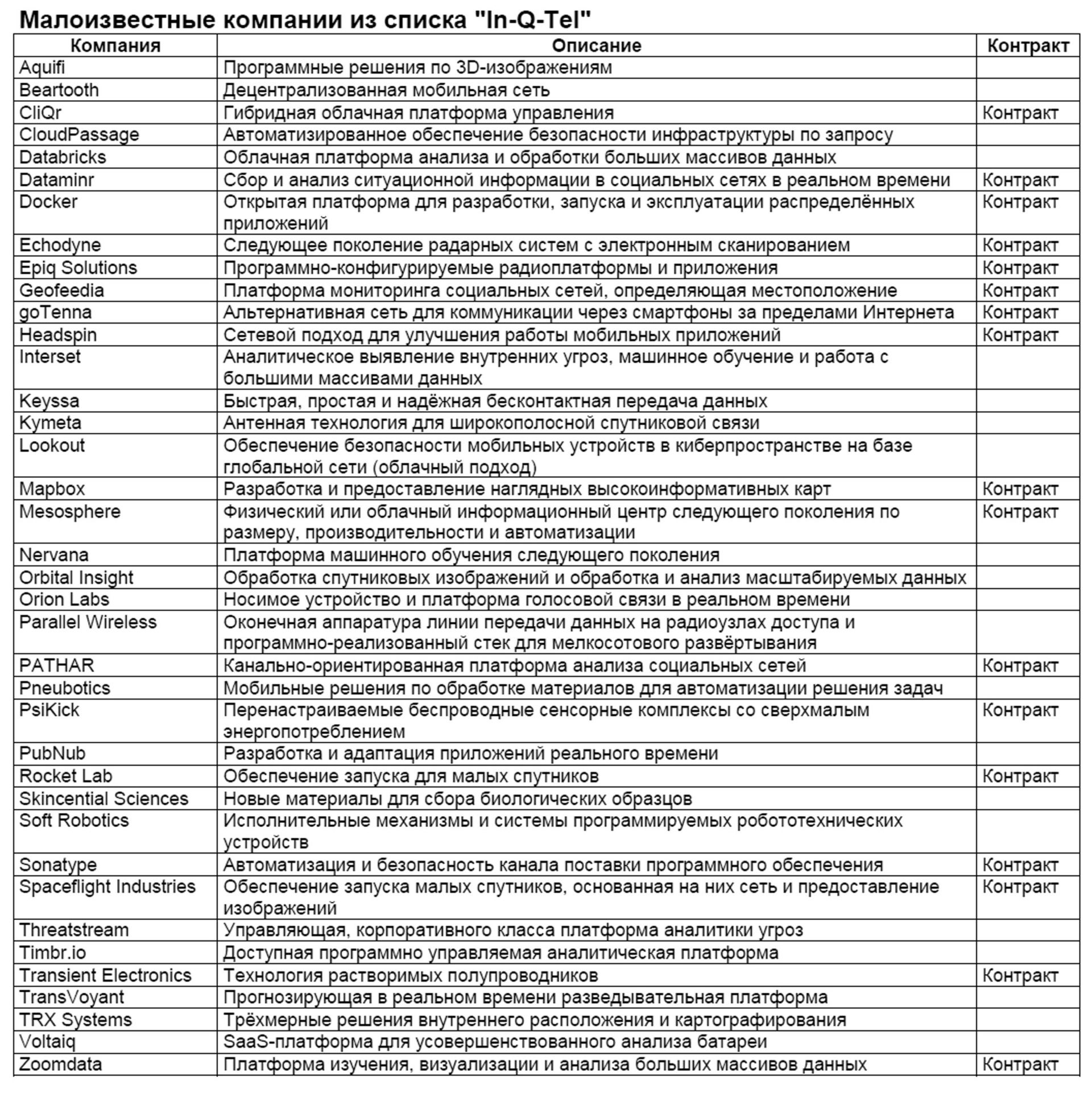
Bruce Land, one of the executives of In-Q-Tel, noted in a 2012 article that “social media monitoring” is increasingly important for government agencies seeking to keep track of “developing political movements, crises, epidemics, and disasters, not to mention general global trends. ”
A recent wave of investment in social media companies makes us think that the CIA has accelerated the move to make collecting user-generated online data a priority. In-Q-Tel, along with its investment in startups, is also developing a special Silicon Valley technology lab called Lab41 to provide intelligence services with large data arrays.
In February, Lab41 published an article exploring the ways in which the location of a certain Twitter user can be predicted fairly confidently through the location of that user's friends. Lab41 currently has a project on Github, a publicly accessible website for developers, to find out “the possibility of using an architecture such as Convolutional and Recurrent Neural Networks to determine emotional coloring - positive, negative or neutral - of Twitter messages (tweets) for any or a specific topic. ”
Intelligence activities related to collecting information on foreign opponents are very useful in countering terrorism, but such surveillance technology, supported by the CIA, is also used by national law enforcement agencies and the private sector to monitor groups of active citizens.
The Palantir company, which was one of the very first to receive support from In-Q-Tel for analyzing social networks, as the hacker group LulzSec announced in 2011, was in the process of negotiating a proposal to monitor union activists and other critics of the US Chamber of Commerce ( the largest lobbying group representing business interests in Washington). The company, now known as the “technology unicorn,” a term for startups with a market valuation of more than $ 1 billion, has distanced itself from this plan after it became generally available among emails from the now defunct company HBGary Federal.
However, other companies supported by In-Q-Tel are currently openly implementing this practice. Geofeedia, for example, conducts research on Greenpeace activists, student demonstrations, advocates of the Minimum Wage Act, and other political movements. Police departments in Auckland, Chicago, Detroit and other major municipalities have contracts with Geofeedia, as well as private firms such as Mall of America and McDonald's.
Lee Gatman, chief executive at Geofeedia, told reporter John Nefel that his company would be able to predict the violence potential of the Black Lives Matter protest movement using only the location and emotional coloring of the tweets. Gatman said that this technology can reveal emotional coloring by applying “positive and negative points” to known phrases, by measuring “the proximity of certain words to others.”
Privacy advocates, however, have expressed concern about these types of automated evaluations.
“When there are private companies deciding which algorithms make you a so-called threatening object or a suspect, then obviously there is a space for collecting information about individuals based on their views or even for such illegal actions based on the race or religion of citizens” said Lee Rowland, plenipotentiary of the American Civil Liberties Union.
She added that the government has a dangerous tendency to rely on information technology companies to “collect comprehensive files on people” using “only constitutionally protected personal conversations.”
